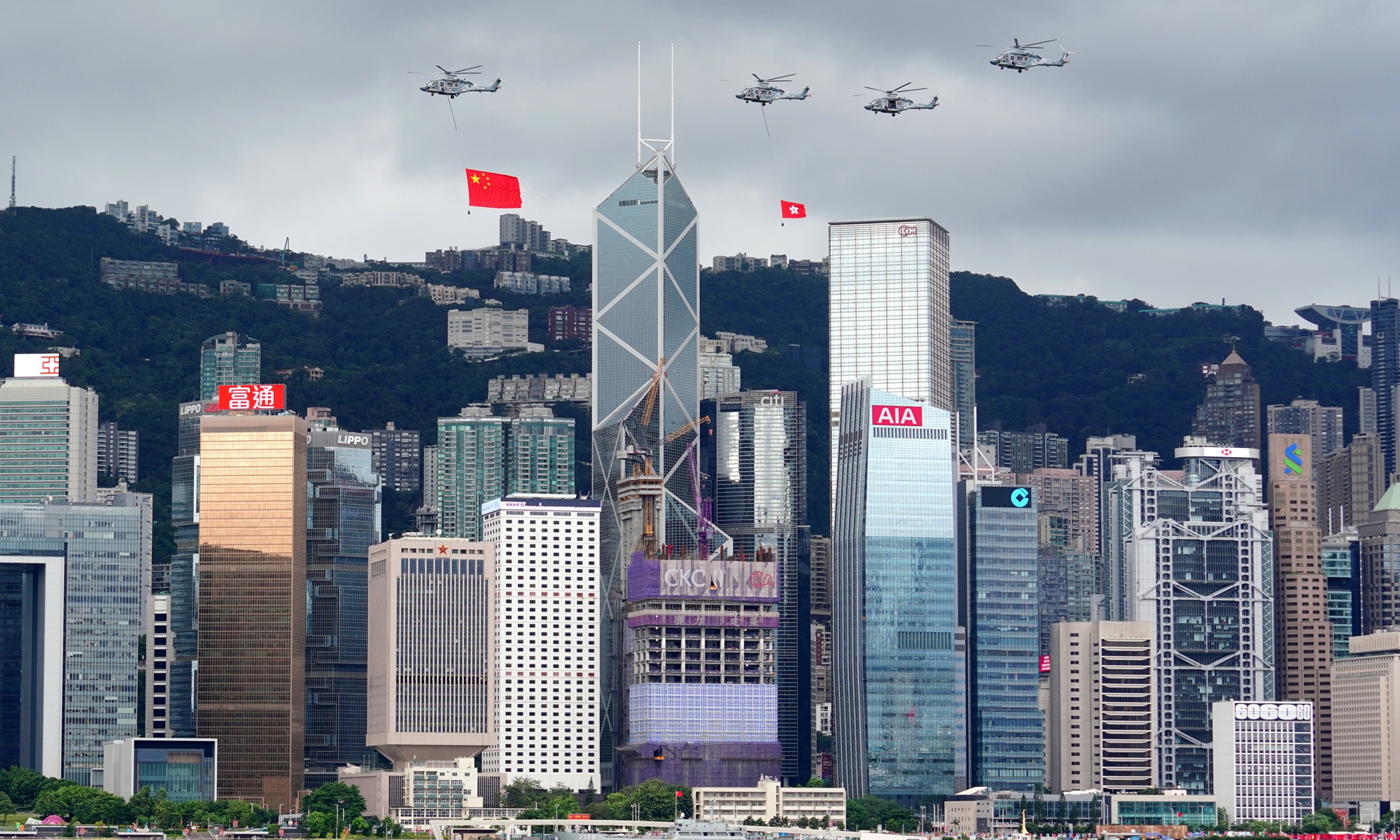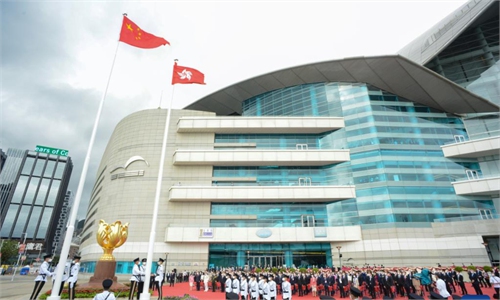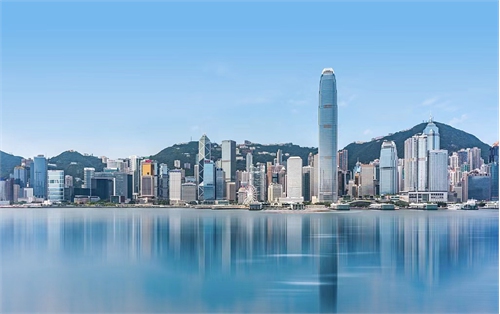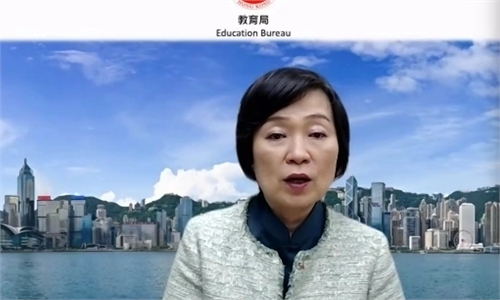UN human rights report on HK 'full of bias, beyond its scope of authority'
No room for UN body to interfere in China's internal affairs by urging withdrawal of national security law: experts

Helicopters displaying the Chinese national flag and the Hong Kong regional flag fly over Victoria Harbour during celebrations of the 25th anniversary of Hong Kong's return to the motherland on July 1, 2022. Photo: cnsphoto
The latest report from a UN human rights body over the situation in Hong Kong is full of bias, subjectivity and double standards, and it goes beyond the scope of its authority, as it urged that the National Security Law (NSL) for Hong Kong be repealed, Chinese officials and experts said, following the UN Human Rights Committee's release of a report claiming "grave concerns" over the NSL for Hong Kong.
Shortly after the report was released, the Hong Kong Special Administrative Region (HKSAR) government published a response of about 4,300 words late on Wednesday night, saying that it is completely dismayed that the committee continues to express unsubstantiated criticisms toward Hong Kong despite the city's delegation's efforts to address concerns and clarify misunderstandings of the human rights situation in Hong Kong.
In response to the criticism of the NSL for Hong Kong, as the committee underscored the shortcomings of the law "including the lack of clarify of 'national security' and the possibility of transferring cases from Hong Kong to the Chinese mainland," a spokesperson for the HKSAR government said that as national security always falls within the purview of the central authorities, "our country has the right to legislate for the matter under the 'one country, two systems' principle."
There are numerous laws in the US, the UK and Western countries dealing with various kinds of national security threats, particularly with regard to terrorism, and these laws are also quite strict and are frequently criticized by human rights groups and international organizations, Lau Siu-kai, deputy head of the Chinese Association of Hong Kong and Macao Studies, told the Global Times on Thursday. "By comparison, the NSL for Hong Kong is not as harsh and only covers four types of universally recognized national security threats."
All national security laws in the West are made or "imposed" by the central governments, not by local authorities, Lau said. Beijing delegated the power to make laws to protect national security to Hong Kong back in 1990, but because of obstruction by anti-China elements, no such laws have been enacted, thus making Hong Kong vulnerable to being used by internal and external hostile forces to threaten national security and undermine Hong Kong's stability, he explained.
"I think the UN committee is not fair to Beijing as it denies the right of the country and Hong Kong to adopt measures to protect themselves," Lau said, noting that it also evinces arrogance, hypocrisy and double standards.
The UN committee mentioned that since the implementation of the NSL, more than 200 people including 12 children had been arrested, and it referred to the International Covenant on Civil and Political Rights (ICCPR), as the HKSAR is a signatory to the covenant.
It should be stressed that during the adoption of the NSL, the ICCPR was fully taken into consideration in the legislative process, with an emphasis placed on the fact that the principle of human rights protection must be observed when safeguarding national security, the government's spokesperson said.
China is not a party to the ICCPR, but since the return of Hong Kong and Macao to the motherland, the ICCPR remains effective in these two SARs in accordance with the Basic Law, Zhao Lijian, spokesperson of the Chinese Foreign Ministry, said at a routine press conference on Thursday.
In accordance with the "one country, two systems" principle and the ICCPR, the Chinese government sent to the committee self-written reports by Hong Kong and Macao SARs and assisted the SARs in the deliberation and dialogue with the committee, Zhao explained.
Since the city's return, the successful practice of the "one country, two systems" principle has been widely recognized and the review process of relevant reports should have been an important window for international society to understand this success, he said.
However, it's regrettable that several committee members, out of ideological bias, ignored the facts and believed untrue information and distorted reports, and made a conclusion that is not objective and is also unfair, which China strongly opposes, Zhao said.
The Human Rights Committee is a body of 18 independent experts that monitors implementation of the ICCPR and political rights by its state parties. However, Chinese experts raised doubts about how objective this committee could be.
"The committee itself is characterized as subjective … those experts who are usually retired diplomats or human rights experts who provide consulting services, whose points of view could be largely affected by their nationalities or scholarly background," Zhu Ying, a professor of the National Human Rights Education and Training Base of Southwest University of Political Science and Law, told the Global Times on Thursday.
Now the committee called for the withdrawal of the NSL for Hong Kong, which exceeded its scope of authority, as such an opinion has no legal binding force, Zhu said, noting that if the committee considers that the fulfillment of the ICCPR is not good enough in Hong Kong and Macao - two signatories of the covenant - it could lay out suggestions, but it can't ask a sovereign state to withdraw its legislation, as that is interfering in China's internal affairs.
Some experts in Hong Kong also expressed disappointment toward the report, saying that it failed to conduct or examine an objective and true evaluation based on facts and reality, as the NSL for Hong Kong helped bring the city back from chaos to stability.
"So far in the implementation and enforcement of the NSL, the majority of Hong Kong people are satisfied with it," Chu Kar-kin, a veteran affairs commentator and a member of the Chinese Association of Hong Kong and Macao Studies, told the Global Times on Thursday.
The committee has no right or authority to tell China to revoke the law, and it should not override the rule of law brutally, Chu said.




